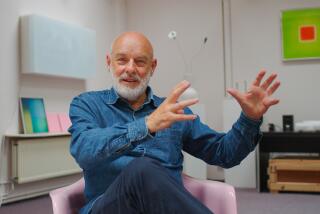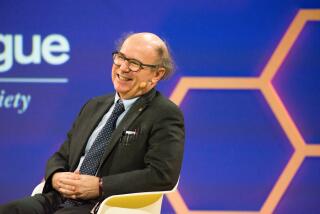BOOK REVIEW : The Tightrope Between Science, Philosophy
- Share via
Cosmogenesis: The Growth of Order in the Universe by David Layzer (Oxford University Press: $24.95; 320 pages)
Physics and biology seem inherently in conflict. The familiar world of physics--objects and masses and falling bodies--is static and ordered. Biology--life--is anything but. It is unpredictable and full of novelty.
Can these fundamentally opposing worlds be reconciled? At a very personal level, we are alive, and we experience free will. But at the same time, we are made up of inanimate stuff that obeys known physical laws. How can this be?
As David Layzer puts it in “Cosmogenesis,” “We feel ourselves to be free and responsible agents, but science tells us (or seems to tell us) that we are collections of molecules moving and interacting according to strict causal laws.”
Should we punish criminals? Maybe they can’t help being criminals. It’s in their chemistry. Should we reward intelligence? Smart people can’t help themselves either. That’s just the way they are.
In short, in a universe determined by the laws of classical physics, where does creativity come from? “Philosophers from Immanuel Kant to Thomas Nagel have argued that the subjective and scientific views of the world--the view from within and the view from without--are irreconcilable,” Layzer says.
This is the problem that he tackles in this demanding but rewarding book, which walks the tightrope that stretches between science and philosophy and never falls off into the abyss of an intellectual black hole.
Layzer is an astrophysicist at Harvard and is firmly rooted in the scientific world view that stretches back to Newton. He believes in determinism--up to a point. Once the initial conditions of a system are known, he says, its future can be predicted with certainty.
But--and here comes the kicker--”certain kinds of initial conditions are unknowable in principle,” Layzer argues. It’s not simply that we do not know the initial conditions at the moment of the Big Bang. Layzer argues that we can never know them.
This is not simply a matter of quantum indeterminacy, which, you will recall, operates only on the level of subatomic particles--microphysics. (How to reconcile the strange world of the quantum with the ordinary world of falling bodies--macrophysics--is another problem that physicists have yet to solve. But let us not digress.)
Layzer isn’t taking that way out. “Some physicists and philosophers have suggested that quantal indeterminacy may provide leeway for free acts in an otherwise deterministic Universe,” he writes. “Freedom, however, doesn’t reside in randomness; it resides in choice.”
Freedom is not the same as randomness. People have personalities, and their future actions, while unpredictable, are not random. To be sure, there is novelty. But it is constrained. As a result, Layzer says, “freedom seems equally inconsistent with determinism and indeterminism.”
A radically deterministic model of biology would hold that every jot and tittle of the course of evolution--every mutation and recombination of the DNA--was knowable and predictable from the outset. What’s more, the future course of evolution also would, in principle, be known.
Layzer rejects this view. Evolution, he says, “not only generates order and information, but does so in an essentially unpredictable way.” It’s not a matter of our ignorance. It’s not that we don’t know the initial conditions well enough. We can never know them in principle. That’s what he means by “essentially unpredictable.”
This is the linchpin of Layzer’s argument, and, frankly, it does not seem to me to follow as surely as night follows day. Perhaps I missed a point somewhere along the way. There’s a lot in this book. Layzer is a smart cookie whose breadth of knowledge is equal to his breadth of analysis.
In any case, he argues, human creativity is analogous to evolution. “Creative human activity is unpredictable in the same way and for the same reasons that biological evolution is unpredictable. We are free because we are, to a considerable extent, the authors of our own lives. . . . Our awareness of the openness of the future and of our own ability to help shape it reflects a deep property of objective reality.”
So his solution to the conundrum of reductionism is that order contains novelty within it: “The Universe is more than a collection of elementary particles governed by immutable mathematical laws. Order and the processes that bring order into being lie at the heart of reality. Biological evolution, cultural evolution and individual human lives not only are the most prolific sources of order in the known Universe but also are creative.”
It’s a cute idea, but I’m not persuaded.


